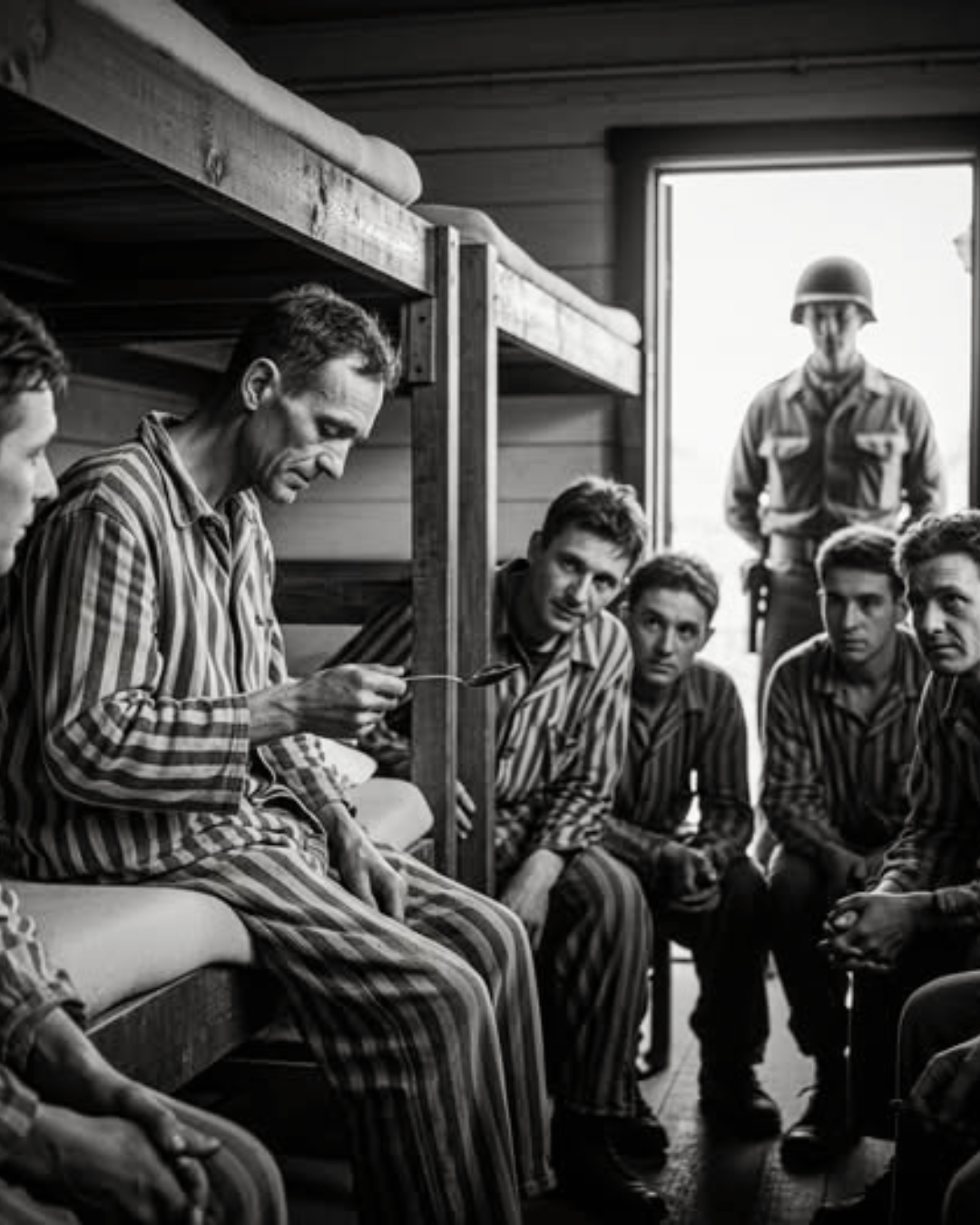The Song of the Rusty Spoon – Buchenwald, 1945
The spring of 1945 didn’t smell like freedom. It smelled of smoke, damp, and the old, fear-soaked wood of the barracks, which for years had served as a silent testament to human degradation. Buchenwald concentration camp—a place that for thousands had become the border between life and death—had finally reached its moment of liberation. American soldiers entered a silence that was not broken by screams, for the prisoners no longer had the strength to cry out. It was a silence too heavy, as if the entire world had momentarily held its breath.
In one of the barracks sat a group of men in striped uniforms, their faces emaciated, their eyes so sunken they looked like dark wells. Beside them stood a helmeted soldier, a rifle slung over his shoulder, this time not as a symbol of terror, but of liberation. Yet even his presence couldn’t dispel the silence. Only when one of the prisoners held up an object so trivial it seemed insignificant—a rusty spoon—did the silence shatter.
This spoon was no ordinary piece of metal. It was a secret, a symbol, a forbidden song of survival. The man, whose hands trembled like leaves in the wind, had hidden it for years, hiding it in a pallet, in the recesses of the barracks, risking his life if it were ever found. In a camp where every slice of bread was precious and every second could be his last, keeping a useless piece of metal with him seemed madness. And yet, this spoon was everything.
The man raised it high, as others had once raised flags or sacred images. Then, very slowly, he tapped it against the iron frame of the bunk. The sound was faint, uneven, but it echoed off the wooden walls of the barracks. It wasn’t music in the classical sense. It was the melody of life. The other prisoners raised their heads, their gazes off the ground for the first time in a long time. They listened.
“It’s not music,” the man whispered, his voice breaking. “But it means we’re alive.”
In that moment, the rusty spoon became more than just an instrument. It became proof that a person can take even the smallest particle of freedom with them into the darkness.
From the very beginning, Buchenwald concentration camp was a place designed to destroy not only the bodies but also the souls of its prisoners. Founded in 1937, it grew over the years, becoming a symbol of terror and a factory of suffering. In 1945, when the US Army entered its gates, they found over 21,000 survivors, their eyes bearing the weight of generations. Each had their own story, each their own small symbols of survival. For some, it was a piece of bread hidden in the seam of their striped uniform; for others, a fragment of a prayer repeated silently; for this man, a spoon that had become a song.
Was it possible that such a simple sound could bring more hope than the most beautiful symphony? That the rhythm of metal clattering against metal could replace the orchestra that never existed? The prisoners in the barracks listened as if spellbound. Their faces lit up with shy smiles that hadn’t been allowed to appear for years.
This sound became a song about Buchenwald , a song about survival, about people who, despite everything, did not allow the remnants of their humanity to be taken away.
Today, when we visit memorial sites, we often ask: how could they survive? How could they maintain hope in a world that seemed designed solely for destruction? The answer lies not in great deeds, but in the smallest gestures. The rusty spoon, picked up at the moment of liberation, was proof that even in hell, a person can create the melody of life.
What happened at Buchenwald in 1945 was never recorded in official reports. American soldiers described hunger, disease, and the piles of bodies. Historians focused on the numbers, on political decisions, on what could be measured and documented. But no one recorded the scene in the barracks, when a few survivors listened to the rhythm of a spoon, a glint in their eyes that belonged no longer to the past, but to the future.
The song about the rusty spoon never made it to sheet music. It had no melody, no words to write down. Yet it endured in the memories of those who heard it. It endured as an echo of that moment, a symbol that freedom sometimes comes in the quietest of sounds.
Can we still hear that song today? Can we see value in the simplest things that carry the power to survive? In a world where the sounds of everyday life drown out everything else, it’s worth pausing for a moment and remembering that clatter. For it tells us more about humanity than thousands of history books.
The liberation of Buchenwald in 1945 was the end of one nightmare, but also the beginning of another—one in which they had to learn to live anew. Those who survived returned to the ruins of their homes, to worlds that no longer existed. Many of them carried untold stories. Some would only tell them years later, others never. But for all of them, that spoon, that rhythm, that song were proof that even in the darkest place, a spark of light could be found.
That’s why, when we talk today about Buchenwald, Auschwitz, and Majdanek, we can’t limit ourselves to statistics. We must tell the story of such moments. About the song about the rusty spoon, which was a hymn to life where everything was supposed to die.
Note: Some content was generated using AI tools (ChatGPT) and edited by the author for creativity and suitability for historical illustration purposes.


Leave a Reply